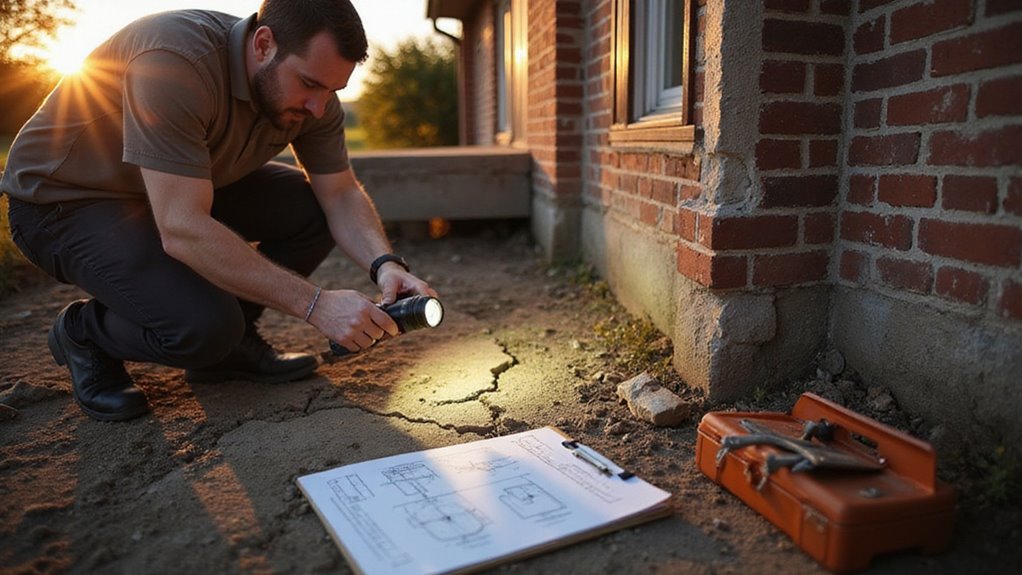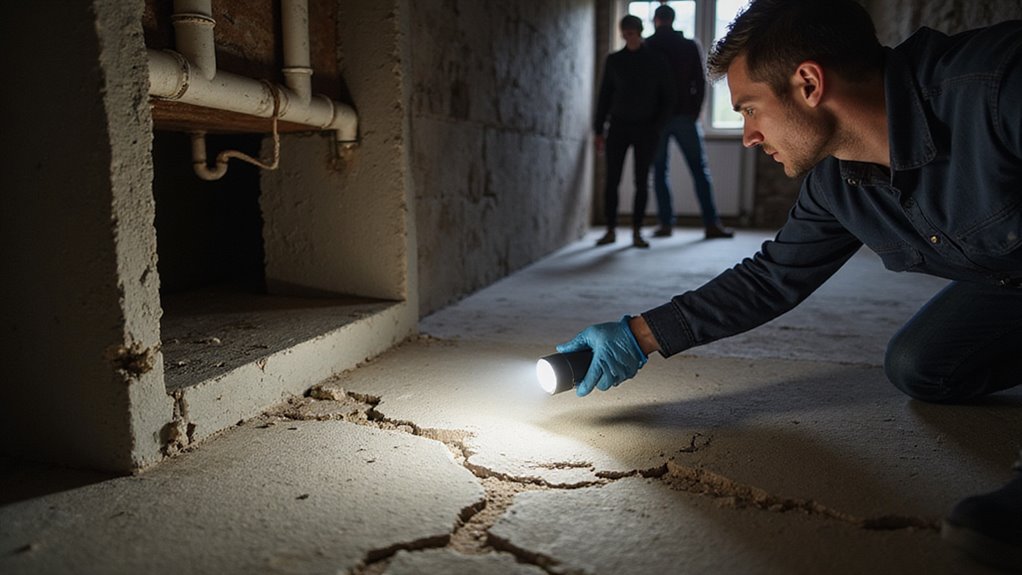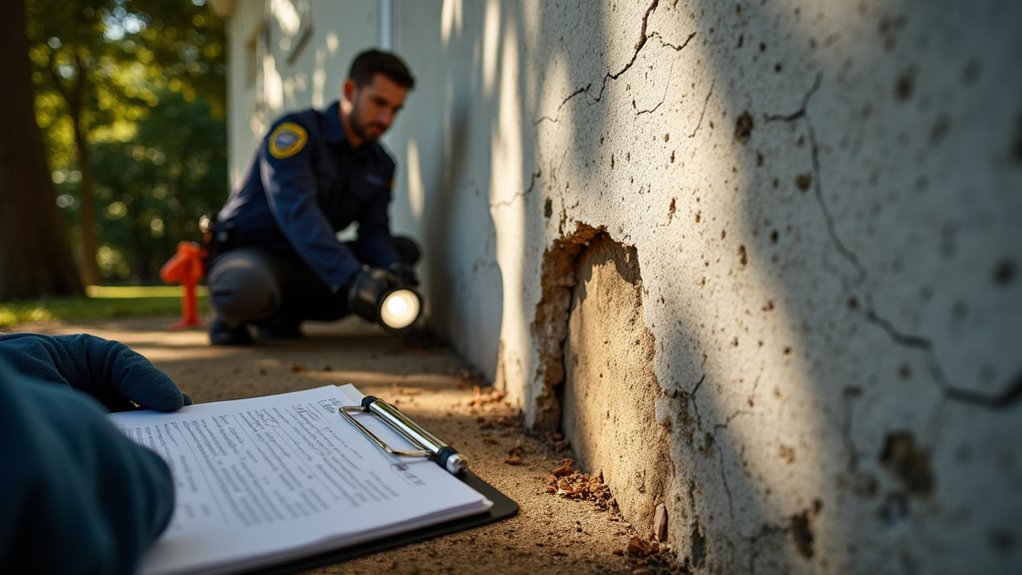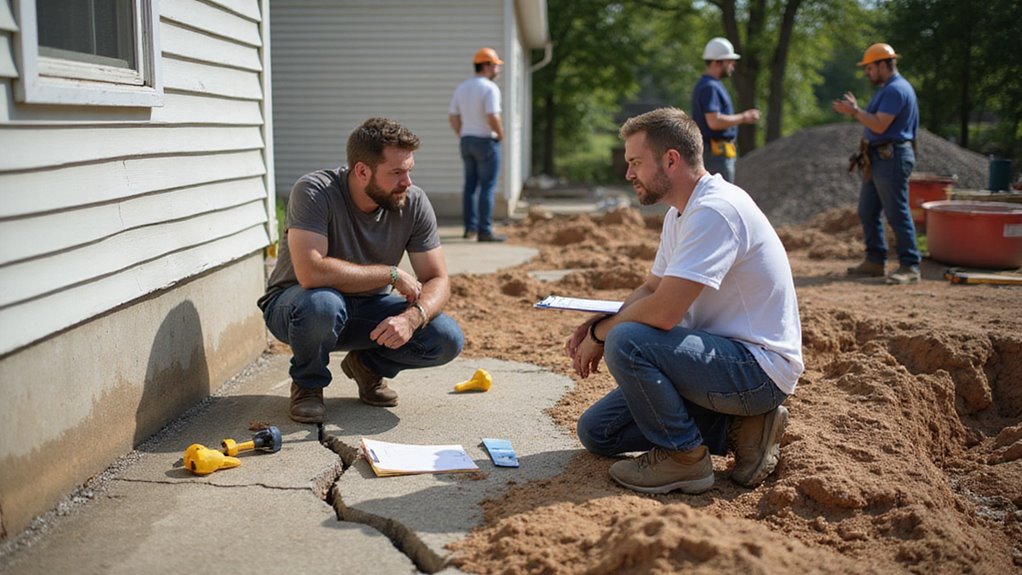Selling a house with foundation problems is a real challenge. Buyers worry about hidden damage and high repair costs. Home inspections can quickly bring these issues to light and affect your home’s value.
This can make your house harder to sell and lower your asking price. Buyers may walk away or demand major repairs. You might feel uncertain about how to move forward with your sale.
Home inspections play a big role in selling a house with foundation problems by revealing the true condition and shaping your sale strategy.
You can decide whether to fix the issues or sell as-is. Understanding the impact helps you make better choices. This blog will guide you through handling foundation issues and help you sell your home with confidence.
Key Takeaways
- Home inspections reveal foundation problems early, allowing sellers to address issues or adjust pricing before listing.
- Foundation issues identified during inspection can lower property value and deter traditional buyers or lenders.
- Sellers are legally required to disclose known foundation problems found in inspections, reducing legal risks and building buyer trust.
- Repair documentation and inspection reports help facilitate negotiations and reassure buyers about the property’s structural integrity.
- Unresolved foundation issues from inspections can lengthen market time or lead to deals falling through, especially with mortgage-financed buyers.
The Role of Home Inspections in Real Estate Transactions

Home inspections are very important in real estate transactions. They help both buyers and sellers understand the true condition of a property. If you ignore inspections, you may face price changes or delays. Scheduling inspections early can help prevent closing delays and keep the transaction on track.
Sellers should know that inspection results can affect the buyer’s decision. If inspectors find issues, buyers can ask for repairs or lower prices. You can avoid surprises by fixing problems and sharing known defects early.
Buyers use inspection reports to protect themselves from hidden problems. If the report finds major issues, buyers can ask for concessions or leave the deal. Good inspection handling makes the process faster and builds trust between both parties.
It’s also crucial for sellers in Virginia to follow strict disclosure rules when selling, since failing to inform buyers about known property conditions or defects can delay the sale or even cause legal issues.
Common Foundation Issues Uncovered by Inspectors
Inspection reports often point out foundation issues that can lower a home’s value. These problems can also make it harder to sell the property. Knowing about common foundation issues helps you prepare for buyer concerns. Cracks in foundation walls or floors are a frequent sign of trouble. Inspectors often find these cracks when the ground under the house is unstable.
If cracks appear, the foundation may be shifting or settling. Uneven or sloping floors are another warning sign. Floors that are not level can mean the foundation is moving. This movement could weaken the building over time. Sticky doors and windows suggest the frames are out of line. If doors or windows are hard to open, the foundation may have shifted. Such movement can affect other parts of the house.
Water around the foundation can also cause problems. If there is constant moisture, the foundation materials might wear down faster. This extra water can also lead to more soil movement under the house. Knowing about these problems early can help you when pricing your house so you can address buyer concerns and adjust your strategy for a quicker sale.
If you know these issues, you can better understand inspection results. This knowledge helps you plan for repairs or answer questions from buyers. Taking action early may prevent bigger problems later. In Virginia, disclose foundation issues is required by law, so being aware of inspection findings can also help you stay transparent and avoid legal trouble during the sale.
How Inspectors Evaluate Foundation Problems

When an inspector assesses your foundation, they’ll start with a comprehensive visual structure evaluation, noting cracks, misalignments, and material degradation. You can expect them to use precision tools to measure settlement indicators, establishing whether movement falls within acceptable tolerances. Inspectors also analyze potential moisture sources, since water intrusion remains a leading contributor to foundation instability and market risk.
If there are signs of related structural issues, inspectors might also recommend further safety assessments or repairs before proceeding with the sale. If you’re selling an inherited home with existing issues, it’s also crucial to understand Virginia inheritance laws to ensure the property transfer process is handled correctly.
Visual Structure Assessment
A visual structure assessment helps find early signs of foundation problems. Inspectors use this method to spot damage that could affect safety. They look for clear warning signs that may lower a home’s value.
Inspectors check the outside for cracks in bricks, walls, or siding. They look at the pattern and size of the cracks. Any crack might mean the foundation is moving.
They examine the inside for crooked doors, windows, or cracks in the walls. If the walls or frames look uneven, it could mean trouble. They also watch for plaster or drywall damage.
Inspectors look for uneven floors or spaces near the baseboards. Sagging or sloping floors can mean the foundation has shifted. Any gap or dip is a cause for concern.
They check for water stains or chalky marks on walls. These can show where water has entered and put stress on the foundation. If moisture is present, there may be a bigger problem.
Measuring Settlement Indicators
Measuring settlement indicators means using special tools to check for foundation movement. Inspectors do not rely on looks alone because they cannot confirm problems that way. Accurate measurements help inspectors find serious issues and suggest suitable repairs.
Professionals use digital levels, laser devices, and crack monitors for this work. Each tool helps track changes over time and compare results to accepted standards. If settlement is found, inspectors use the data to explain the problem and support repair decisions.
Below is a list of key tools and their uses:
| Tool/Device | Purpose | Benefit |
|---|---|---|
| Digital Level | Checks floor deviations | Shows where floors are uneven |
| Laser Level | Sets straight lines | Detects small movements clearly |
| Crack Monitor | Watches crack changes | Tracks ongoing foundation shifts |
Identifying Moisture Sources
Moisture sources must be found to prevent foundation problems. Inspectors look for all possible ways water can enter a home. If moisture is not controlled, the foundation may move or crack.
Inspectors start by checking if the ground slopes toward the house. Poor grading can let water flow to the foundation. Landscaping near the home is also reviewed for drainage issues.
Gutters and downspouts are examined for leaks or clogs. If these parts do not work well, water may pool near the house. Extensions are checked to ensure they carry water far enough away.
Plumbing is inspected for leaks in crawlspaces, basements, or under slab floors. A hidden leak can cause wet soil under the foundation. This may lead to structural damage if left untreated.
Exterior walls are checked for cracks, gaps, or missing sealant. Any opening can let rainwater into the structure. If problems are found, repairs should be made quickly.
Addressing these moisture sources keeps the foundation stable. Buyers feel more confident when moisture issues are managed. Proper actions can help maintain the property’s value.
Red Flags Buyers Watch for During Inspections

Buyers look for warning signs during home inspections. Foundation problems can make buyers walk away from a deal. If an inspector finds issues, buyers may reconsider their offer.
Inspectors check for cracks in walls and bricks. They also look for sloping or uneven floors. Sticking doors and windows can be a sign of shifting foundations.
A critical aspect of selling is whether clear title transfer is possible, since unresolved liens related to repairs can complicate the transaction. Cracks in walls, uneven floors, or sticking doors may reveal shifting foundations during a home inspection.
Gaps between walls and ceilings are another warning. Separation in exterior trim may point to movement. Prior repairs or patches often need a closer look.
If the soil is clay or drains poorly, it can cause foundation trouble. Evidence of past fixes suggests the problem may not be solved. Unresolved issues can lead to expensive repairs later.
Buyers will also pay close attention to the property condition since homes with unresolved foundation problems or visible deferred maintenance tend to sit on the market longer or receive lower offers.
Impact of Foundation Issues on Property Value
Foundation issues can lower the value of a property. Structural problems often cause buyers to make lower offers or lose interest. If the issues are not fixed, the property may be harder to sell.
A structural inspection shows how serious the damage is and estimates repair costs. If repairs are needed, the listing price usually drops. In a busy market, homes with foundation problems may attract fewer buyers. Potential buyers may also worry about longer-term structural risks and ongoing maintenance costs related to the foundation.
Foundation problems affect value in several ways. Buyers may see the home as a risk and hesitate to buy. Appraisers often lower the property’s value to reflect repair costs.
If sellers do not fix the problems, buyers may ask for price reductions or repair credits. These homes also tend to stay on the market longer. If repairs are completed before selling, the property may attract more buyers and sell faster.
Pricing a home with foundation problems often requires researching comparable sales to ensure a fair and competitive listing price.
Disclosure Requirements for Sellers

You must comply with strict legal disclosure obligations when selling a property with foundation issues. Transparent communication improves buyer trust and can streamline negotiations. Failing to disclose known problems may expose you to significant legal penalties and jeopardize the transaction.
In addition, working with as-is sales often requires even more comprehensive disclosure to fulfill legal requirements and prevent future liabilities. In situations involving court approval or probate properties, these disclosure requirements become even more crucial to ensure legal compliance and avoid future disputes.
Legal Disclosure Obligations
Sellers must follow state rules when selling property with foundation problems. Laws require you to tell buyers about any known issues. If you do not disclose, you may face legal trouble or fines.
Most states list what counts as a serious problem that must be reported. You should learn your local laws and use the correct forms. This will help you avoid future disputes.
You should read all state and city disclosure rules before listing your home. Make sure you fill out all forms honestly, especially about foundation damage. Keep records of any repairs or inspections.
If you have questions, ask a real estate lawyer for help. Lawyers can explain your duties and protect you from legal risks. Proper steps now can prevent problems later.
Impact on Buyer Trust
Full disclosure of foundation issues builds buyer trust. Buyers see honesty about problems as a sign of reliability. They feel more comfortable making an offer if they know the facts.
Providing details about repairs or soil work reassures buyers. This shows you have addressed problems and not ignored them. If buyers receive reports or warranties, they know you have done your homework.
Buyers often expect technical documents before making decisions. Sharing these documents can speed up negotiations. If buyers trust you, they may offer a better price.
Being open about foundation issues can protect your property’s value. Transparency reduces the chance of surprises after closing. If you are honest, buyers are less likely to back out.
Penalties for Nondisclosure
Many states require sellers to tell buyers about any known foundation problems before selling a home. If you hide these issues, you may face serious consequences. The law protects buyers and keeps the real estate market fair.
If you do not disclose problems, buyers can sue you for money or damages. Courts might cancel the sale and make you take the house back. Government agencies may also fine you for breaking disclosure laws.
Your reputation could suffer if you do not follow these rules. Future buyers might not trust you. Always tell the truth about any problems to avoid legal trouble.
Repair Options After an Inspection

After an inspection finds foundation issues, sellers have several ways to handle repairs. These choices can affect property value and buyer interest. Making the right decision is important for a smooth sale. Sellers should be aware that selling as-is with unfixed foundation problems may result in a significantly lower sale price and a smaller pool of interested buyers.
Professional foundation repair is the most reliable option. It usually increases buyer trust and helps with the appraisal process. This choice often leads to better sale terms.
Minor cosmetic fixes are another option, but they rarely meet lender requirements. These fixes can also lower the appraised value. Sellers should use this option only if the damage is very minor.
Some sellers offer a home warranty for future foundation repairs. This can reassure buyers about long-term risks. However, it may not satisfy all buyers or lenders.
If foundation problems are not fixed, the home may get a lower appraisal. Unresolved issues can turn away buyers. Addressing the problem quickly is key to a successful sale.
Sellers should also consider decluttering and depersonalizing to make the home more attractive to buyers, especially when dealing with foundation concerns.
Negotiating Repairs With Buyers
Negotiating repairs with buyers means discussing and agreeing on how to handle home problems. If the foundation has issues, buyers will want proof of the problem and a clear plan to fix it. Sellers must be honest and provide solutions that make buyers feel safe.
Sellers should get several repair estimates from trusted companies. An engineering report can help explain what repairs are needed. Buyers may want these repairs finished before closing or ask for credit to handle them later.
All repair agreements should be clear and include repair standards and warranties. Good records help both sides trust each other. If everyone understands the plan, the sale goes more smoothly. In Waynesboro, sellers can also consider all-cash purchases from local buyers as an alternative to repairs, which can save time and avoid complicated negotiations.
How Foundation Problems Affect Buyer Financing
Foundation problems can make it hard for buyers to get a loan. Lenders see houses with foundation issues as risky. If a home has settlement or cracks, getting traditional financing becomes difficult.
Loan providers often need detailed reports or repairs before approving the mortgage. FHA, VA, and conventional loans all have strict rules about a home’s condition. If a foundation is not fixed, buyers may get denied or need more expensive loans.
Sellers will have fewer interested buyers when foundation problems exist. Many buyers rely on standard loans, which may not be possible with these issues. If you understand these challenges, you can plan ahead and keep your sale moving forward.
The Importance of Documentation and Repair History
You need to maintain thorough records of all foundation repairs and provide documentation as proof of completed work. Transparent disclosure of past issues, backed by repair history, builds buyer confidence and streamlines the transaction process. Lenders and inspectors will scrutinize these details, so organized records can directly impact your marketability and closing timeline.
Proof of Completed Repairs
Buyers and inspectors closely examine repair documents to confirm quality repairs. Proof of completed repairs shows the work was done professionally and followed building codes. If you provide clear records, buyers feel more confident and inspectors can easily check for proper repairs.
Good documentation can also help with insurance claims and make your home easier to sell. Detailed records support any active warranties and prove repairs were completed. If you want to attract serious buyers, you should collect all important paperwork.
A complete repair file should include invoices from licensed contractors, engineering reports, and warranty documents. Insurance claim summaries that show repair details are also important. Proper paperwork protects you and makes the selling process smoother.
Disclosing Past Issues
If your house had foundation problems before, you must tell buyers about it. Full disclosure is the law and builds trust. You should give details about what happened and how you fixed it.
Buyers will want to see records of repairs and professional reports. These documents show the home’s current condition. Accurate information helps buyers decide and protects you from future problems.
If you have repair invoices, engineering reports, or soil tests, organize them clearly. The table below shows which documents to collect:
| Document Type | Purpose |
|---|---|
| Repair Invoices | Show what foundation work was done |
| Engineering Reports | Confirm the structure is now stable |
| Soil Stability Test | Explain the ground under the house |
| Warranty Information | Prove any ongoing repair coverage |
If you keep good records, buyers can judge any future risks. Clear information makes negotiations smoother and shows you are honest.
Selling As-Is Versus Making Repairs
Selling a home with foundation issues means you must choose between selling as-is or fixing the problems first. Selling as-is usually attracts cash buyers or investors at a lower price. Making repairs can help you get a higher offer from more buyers.
If you decide to make repairs, your home may get a better appraisal. Repairs can also attract more traditional buyers. Staging works best if structural issues are fixed.
Consider the cost of repairs compared to how much they could raise your home’s value. Think about how repairs affect the appraisal and who is likely to buy in your area. Staging only helps if the main problems have been solved.
Look at these factors to decide the best option for your situation.
Marketing Strategies for Homes With Foundation Issues
You’ll maximize buyer interest by presenting repair estimates clearly, enabling prospects to assess true project scope. Prioritize outreach to investor networks that specialize in value-add opportunities and distressed assets. Position the property’s latent value and redevelopment potential as key selling points in your marketing materials.
Highlight Repair Estimates Transparently
The best way to market a home with foundation issues is to share repair estimates clearly. Honest cost information helps buyers trust your listing. If buyers see exact numbers, they can decide faster and with less worry.
You should give itemized quotes from licensed contractors or engineers. If you show timelines for repairs, buyers know what to expect. Warranties or repair guarantees should be listed if they are available.
Before-and-after inspection reports can show buyers the true extent of repairs. If you provide these documents, buyers will feel more confident. Clear details make it easier for everyone to understand the property’s needs.
Target Investor Buyer Pool
When selling a property with foundation issues, focus on investors who buy homes that need repairs. These buyers know how to handle risks and renovations. Traditional home shoppers usually want move-in-ready houses.
You should share inspection reports and repair estimates with investors. If buyers see clear data, they will trust your information. This builds credibility and helps serious investors make quick decisions.
Different investors look for different opportunities. Flippers want to see renovation potential. Buy-and-hold investors need rental market details, while developers will want zoning and lot information.
Contractors want technical inspection data before making an offer. Portfolio investors may be interested in discounts for multiple properties. If you explain each opportunity clearly, you can attract the right type of buyer.
Clear communication and honest information make negotiations easier. If sellers educate buyers, the sale can move faster. This approach helps both parties reach a good agreement.
Emphasize Property’s Untapped Potential
Foundation issues can make buyers worry, but these problems can also create strong investment opportunities. The property offers a chance for buyers to add value through repairs and updates. Buyers could see it as a place to design their own space and build equity.
Landscaping improvements can make the home look better from the outside, even if there are some foundation issues. Professional staging can shift the focus to the home’s layout and design options. Clear repair estimates from contractors help buyers understand costs and plan their budget.
If buyers want, they can add modern systems or energy-saving features during repairs. This can increase the home’s market appeal and long-term value. These points attract buyers who look for homes with hidden potential.
Legal Considerations for Sellers
If you are selling a home with foundation problems, you have legal duties. Most states require you to tell buyers about known issues. Foundation problems are considered material defects and must be disclosed.
You must keep records of all repairs and inspections. Accurate documentation helps protect you from legal trouble. If you hide information, you could face lawsuits or financial loss.
Buyers often check public records and property histories. If you do not disclose problems, buyers will likely find out. Honest disclosure builds trust and helps avoid disputes.
Following these laws makes the sales process smoother. If you follow disclosure rules, you reduce your risk of future problems. Understanding your legal duties protects you and the buyer.
Working With Real Estate Professionals for a Smooth Sale
Working with real estate professionals can make selling a house with foundation issues much easier. Agents help you handle disclosures, pricing, and negotiations. Their experience protects your interests and lowers the risk of mistakes.
Real estate agents know about foundation repairs and local market values. They use this knowledge to set a fair price and find buyers open to homes with problems. If you need repair estimates, they can connect you with trusted contractors.
Agents also make sure you follow all legal disclosure rules. If you fail to disclose issues, you could face legal trouble. With an agent, you meet the requirements and reduce your risk.
If buyers ask for repairs or price cuts, your agent handles these talks. They explain technical details so you get fair terms. With expert help, you are more likely to have a smooth, legal sale.
Conclusion
If you are selling a house with foundation problems, home inspections are very important. They reveal issues to buyers and help avoid misunderstandings. If you share inspection results, you build trust and reduce legal risks.
If you decide to fix the problems or sell the house as-is, inspection reports are helpful. They make negotiations smoother and help both sides feel secure. If you want to sell quickly, selling to a cash buyer can be a good option.
If you need to sell your house fast, we can help. At Align Real Estate Solutions, we buy houses for cash in any condition. Contact us today to get started and see how we can make the process easy for you.
Author
-

Zach Koops is co-founder and Real Estate Success Manager at Align Real Estate Solutions, serving homeowners across Virginia since 2024. With a passion for real estate and a heart for people, Zach has built his career around helping sellers navigate tough situations—foreclosure, inheritance, relocation, repair-overload—with clarity and compassion. He’s known for being straightforward, steady under pressure, and deeply invested in relationships. Outside of work, he spends his time as a husband and father, enjoys the outdoors in Shenandoah Valley, loves singing on stage, and constantly seeks growth through reading and new experiences.









